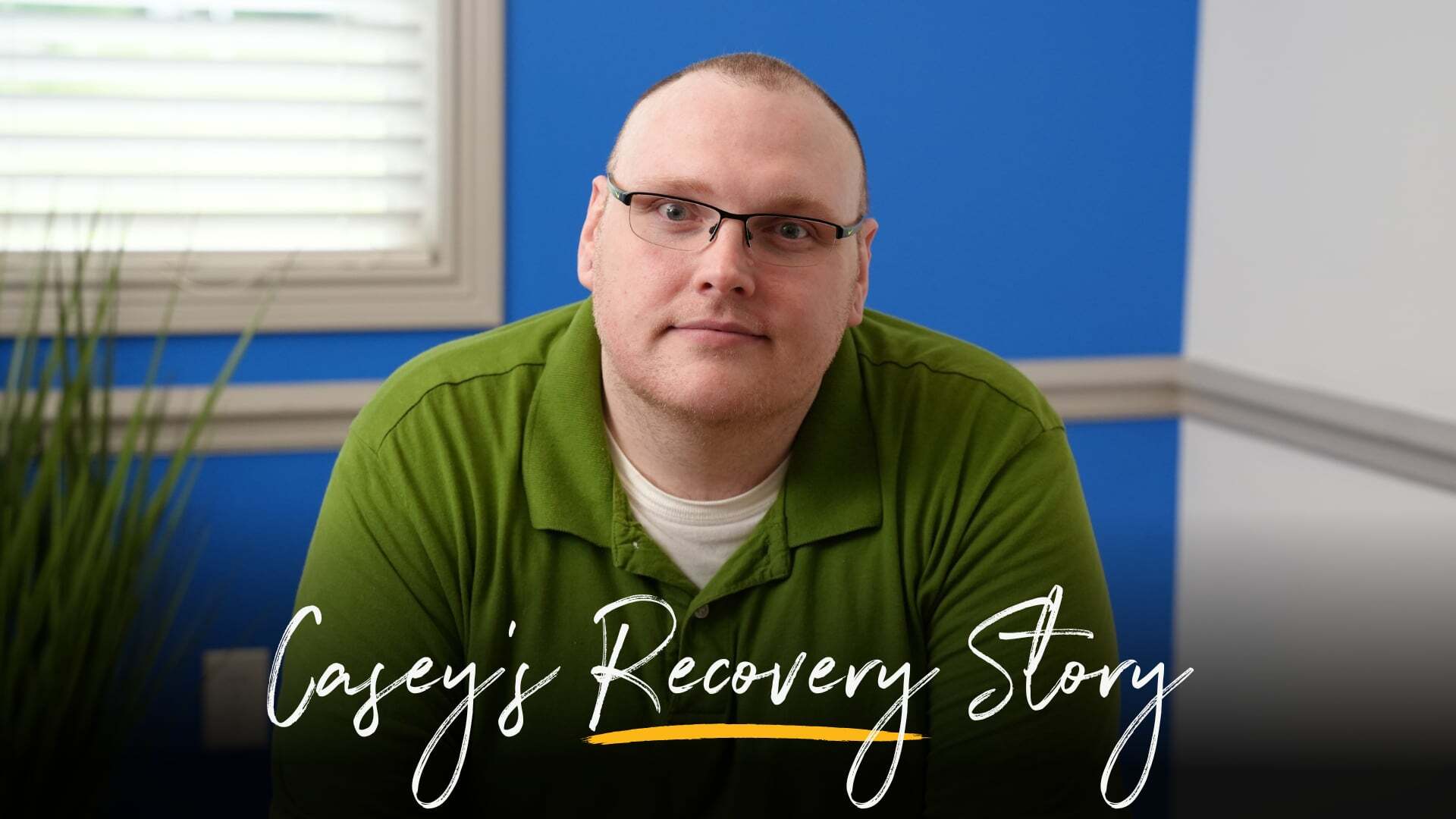
Casey shares how BHG’s medication-assisted treatment (MAT) gave him stability, hope and the tools to stay in long-term recovery.
All across the country, many people develop opioid use disorder without ever meaning to.
It can start with an accident—a broken bone, a surgery or a bad back. A doctor prescribes medication to help with the pain and recovery process. The medicine works at first, but before long the body craves more.
That’s what happened to Casey of Bowling Green, Kentucky.
After a serious fall on the job, the prescription pain killer medicine that was supposed to help him heal slowly pulled him into addiction. His story shows how fast opioids can take over the brain—and how recovery is still possible with the right support.
Descent Into Opioid Addiction
Casey remembers the day everything changed. In 2008, he was working on a church building, chipping out old mortar while standing on a tall scaffold.
“I’m scared of heights, but I kept climbing,” he says. “I didn’t know the scaffold was coming apart.”
It tipped, and he fell about ten feet, landing on rubble, breaking his pelvis and back. Doctors sent him home with prescription pain killer medicine.
“At first the pills helped me get through the day. But soon I needed more just to feel normal,” Casey explains.
When the refills stopped, the withdrawal symptoms began.
“I couldn’t do anything without being high. Instead of getting paid at work, I’d ask for pills. I lost my home. My girlfriend left. My family didn’t want to be around me.”
Within two years, Casey was sleeping on his sister’s laundry-room floor—ashamed, alone and always thinking about the next pill.
Facing the Truth About Opioid Use Disorder
Casey recalls the night everything fell apart.
“My girlfriend tried to talk to me about my using. I got defensive and it spiraled,” he says. “In a flash of anger I grabbed her—and thought I’d hurt her. I panicked, stole the rent money and the sheriff showed up. The guilt of that night stayed with me for years.”
That night forced him to face the truth: opioid use disorder (OUD) had taken over his life. Fear, shame and memories of addiction in his family all came rushing in.
“I hated the person I’d become. That’s when I reached out to my cousin, who was in recovery and asked for help.”
Finding Support Through MAT
Before finding lasting recovery, Casey tried almost everything.
He went to 12-step meetings, worked with sponsors and used other medications, but nothing seemed to work. Each attempt brought short bursts of hope, followed by the same slide back into cravings and withdrawal.
Then he heard about Behavioral Health Group (BHG) in Bowling Green, Kentucky and their medication-assisted treatment (MAT) program. Desperate for a real solution, he decided to give it one more try.
“At first I was scared,” Casey remembers. “But the doctor reassured me and the staff made sure I was safe. I realized this was my only way out.”
Starting methadone treatment changed everything. The medication gave him steady relief from withdrawal, but it was the combination of methadone and counseling that truly helped him heal.
“With methadone, you can’t cheat the system,” he says. “It gave me structure. Counseling gave me hope.”

Counseling and Compassion at BHG
Casey describes counseling as a lifeline in his recovery. His counselor provided non-judgmental support, helped him manage his co-occurring conditions - anxiety and depression - and was there even on the hardest days.
“My counselor is amazing. She advocates for me, listens without judgment and helps me when I’m struggling. I know I can text her anytime. That support has kept me grounded.”
At BHG Bowling Green, Casey found a welcoming community where patients are greeted by name and treated with dignity. Several of his own family members now receive treatment at BHG as well.
“When I walk into the clinic, it feels like a family reunion.”
Life After Addiction
Recovery gave Casey his life back. He had his record expunged, regained trust with his partner and found joy in music. He now writes and produces songs with his cousin – many about recovery.
“I don’t have to wake up looking for drugs anymore. I feel happy and I feel like I’m doing the right thing. I wouldn’t be who I am today without going through recovery.”
He also paid it forward by driving peers to the center, creating a supportive network along the way.
“Everyone was quiet on the early-morning drive there. But on the way back, we were all talking and laughing because we knew we were okay.”
Recovery Is Preparedness
Even after a back surgery in 2024, Casey stayed strong in recovery. Working with his doctor, he created a pain-management plan to avoid relapse.
“I was terrified to take pain medication again, but I had the tools BHG taught me. I was able to use what I learned and stop when the pain was gone.”
Casey's Message to Others
“Addiction isn’t a curse. You don’t have to do this alone. Places like BHG have the medication and the support to help you. Just come and get help.”
Start Your Recovery Journey Today
You or your loved one don’t have to face opioid addiction alone—help is here today. Talk to our compassionate team now at 844-535-7291 or find a BHG treatment center near you and start your recovery journey.
If you’re a healthcare provider or a community partner with a patient who can benefit from treatment from opioid use, refer them today. Call 866-763-2244 or submit a form on our website.
Recovery is possible. Casey’s story shows that with an evidence-based approach, a full life after addiction is within reach.
Begin your path to healing today.
Frequently Asked Questions About Opioid Use Disorder Treatment in Kentucky
At BHG, we know timing is critical. Our Kentucky treatment centers offer same-day or next-day admissions. Our team makes the intake process simple, helping patients start treatment quickly so recovery doesn’t have to wait.
Methadone is a long-acting, FDA-approved medicine that reduces cravings and withdrawal symptoms. At BHG treatment centers in Kentucky, methadone is prescribed in a safe, structured setting as part of a personalized plan that includes medication management and counseling. This approach helps patients stabilize so they can focus on rebuilding their lives.
Behavioral Health Group (BHG) operates multiple outpatient MAT clinics across Kentucky including:
- BHG Berea Treatment Center – Berea, KY
- BHG Bowling Green Treatment Center – Bowling Green, KY
- BHG Corbin Treatment Center – Corbin, KY
- BHG Elizabethtown Treatment Center – Elizabethtown, KY
- BHG Frankfort Treatment Center – Frankfort, KY
- BHG Hazard Treatment Center – Hazard, KY
- BHG Lexington Treatment Center – Lexington, KY
- BHG Louisville Treatment Center – Louisville, KY
- BHG Paducah Treatment Center – Paducah, KY
- BHG Paintsville Treatment Center – Paintsville, KY
- BHG Pikeville Treatment Center – Pikeville, KY
- BHG Richmond Treatment Center - Richmond, KY
Medication alone isn’t enough. At BHG, every patient in Kentucky receives counseling alongside methadone or other medications. Counseling helps address things like stress, triggers and repairing relationships while building coping skills for lasting recovery. Patients say this combination makes the biggest difference.
It’s different for everyone. MAT is not a one-size-fits-all treatment. Some patients stay on methadone, buprenorphine (Suboxone) or naltrexone for years; others taper down with their doctor’s guidance once they feel ready. At BHG, the timeline depends on each person’s needs and recovery goals.
Yes. BHG accepts Medicaid, Medicare and most commercial insurance plans. For those without coverage, financial assistance . and payment options are available.
Relapse doesn’t mean failure. It’s part of many recovery journeys. In this feature, Casey tried several approaches before finding success with MAT at BHG. Recovery is a process and every step forward counts.
